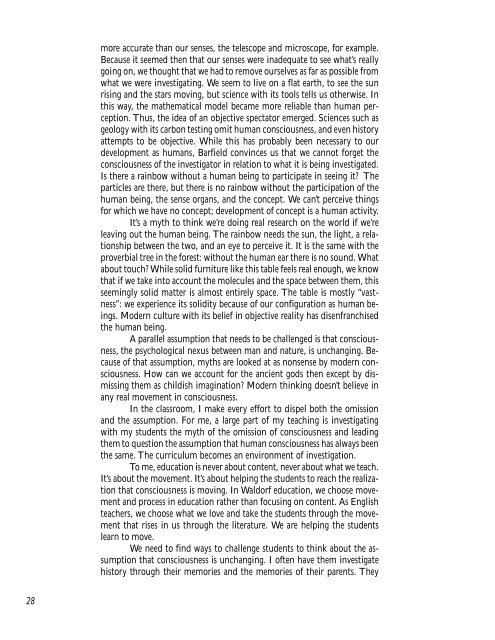Colloquium on English - Research Institute for Waldorf Education
Colloquium on English - Research Institute for Waldorf Education
Colloquium on English - Research Institute for Waldorf Education
You also want an ePaper? Increase the reach of your titles
YUMPU automatically turns print PDFs into web optimized ePapers that Google loves.
28<br />
more accurate than our senses, the telescope and microscope, <strong>for</strong> example.<br />
Because it seemed then that our senses were inadequate to see what’s really<br />
going <strong>on</strong>, we thought that we had to remove ourselves as far as possible from<br />
what we were investigating. We seem to live <strong>on</strong> a flat earth, to see the sun<br />
rising and the stars moving, but science with its tools tells us otherwise. In<br />
this way, the mathematical model became more reliable than human percepti<strong>on</strong>.<br />
Thus, the idea of an objective spectator emerged. Sciences such as<br />
geology with its carb<strong>on</strong> testing omit human c<strong>on</strong>sciousness, and even history<br />
attempts to be objective. While this has probably been necessary to our<br />
development as humans, Barfield c<strong>on</strong>vinces us that we cannot <strong>for</strong>get the<br />
c<strong>on</strong>sciousness of the investigator in relati<strong>on</strong> to what it is being investigated.<br />
Is there a rainbow without a human being to participate in seeing it? The<br />
particles are there, but there is no rainbow without the participati<strong>on</strong> of the<br />
human being, the sense organs, and the c<strong>on</strong>cept. We can’t perceive things<br />
<strong>for</strong> which we have no c<strong>on</strong>cept; development of c<strong>on</strong>cept is a human activity.<br />
It’s a myth to think we’re doing real research <strong>on</strong> the world if we’re<br />
leaving out the human being. The rainbow needs the sun, the light, a relati<strong>on</strong>ship<br />
between the two, and an eye to perceive it. It is the same with the<br />
proverbial tree in the <strong>for</strong>est: without the human ear there is no sound. What<br />
about touch? While solid furniture like this table feels real enough, we know<br />
that if we take into account the molecules and the space between them, this<br />
seemingly solid matter is almost entirely space. The table is mostly “vastness”:<br />
we experience its solidity because of our c<strong>on</strong>figurati<strong>on</strong> as human beings.<br />
Modern culture with its belief in objective reality has disenfranchised<br />
the human being.<br />
A parallel assumpti<strong>on</strong> that needs to be challenged is that c<strong>on</strong>sciousness,<br />
the psychological nexus between man and nature, is unchanging. Because<br />
of that assumpti<strong>on</strong>, myths are looked at as n<strong>on</strong>sense by modern c<strong>on</strong>sciousness.<br />
How can we account <strong>for</strong> the ancient gods then except by dismissing<br />
them as childish imaginati<strong>on</strong>? Modern thinking doesn’t believe in<br />
any real movement in c<strong>on</strong>sciousness.<br />
In the classroom, I make every ef<strong>for</strong>t to dispel both the omissi<strong>on</strong><br />
and the assumpti<strong>on</strong>. For me, a large part of my teaching is investigating<br />
with my students the myth of the omissi<strong>on</strong> of c<strong>on</strong>sciousness and leading<br />
them to questi<strong>on</strong> the assumpti<strong>on</strong> that human c<strong>on</strong>sciousness has always been<br />
the same. The curriculum becomes an envir<strong>on</strong>ment of investigati<strong>on</strong>.<br />
To me, educati<strong>on</strong> is never about c<strong>on</strong>tent, never about what we teach.<br />
It’s about the movement. It’s about helping the students to reach the realizati<strong>on</strong><br />
that c<strong>on</strong>sciousness is moving. In <strong>Waldorf</strong> educati<strong>on</strong>, we choose movement<br />
and process in educati<strong>on</strong> rather than focusing <strong>on</strong> c<strong>on</strong>tent. As <strong>English</strong><br />
teachers, we choose what we love and take the students through the movement<br />
that rises in us through the literature. We are helping the students<br />
learn to move.<br />
We need to find ways to challenge students to think about the assumpti<strong>on</strong><br />
that c<strong>on</strong>sciousness is unchanging. I often have them investigate<br />
history through their memories and the memories of their parents. They

















